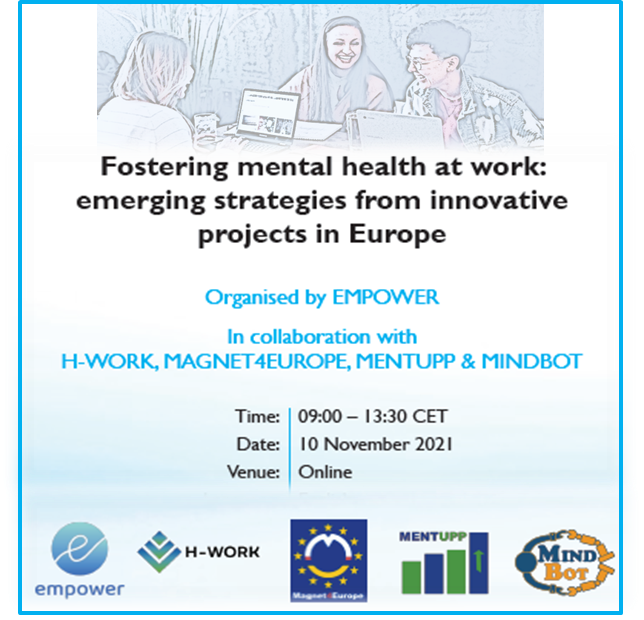|
Scope and purpose
The EMPOWER project (The European Platform to Promote Wellbeing and Health in the workplace), is a European project which aims to reduce the impact of mental health problems in the workplace. It has received funding from the European Union’s Horizon 2020 Research and Innovation Programme under the “Mental Health in the Workplace” topic. EMPOWER, together with sister EU-funded projects (H-WORK, MAGNET4EUROPE, MENTUPP and MINDBOT), have organised a Webinar entitled Fostering mental health at work: emerging strategies from innovative projects in Europe, which will take place on November 10, from 9 am to 1:30 pm (CET). Register now for free and receive a copy of the weblink for connecting. Download the programme here. This Webinar is a great opportunity for researchers and stakeholders (e.g., employers and employees in the private and public sector, policymakers and insurers) to get the latest insights on innovative initiatives to improve mental health in the workplace across Europe and learn from the experts on how to increase the impact of research, bringing together academia and industry. Also, it is a fantastic way to draw attention to barriers to mental health, such as lack of mental health services and stigma in the workplace. Why mental health in the workplace matters As reported by the World Health Organization (WHO), mental health conditions can have a substantial effect on all areas of life (e.g., work performance, relationships with family and friends, etc.). Two of the most common mental health conditions, depression and anxiety, cost the global economy US$ 1 trillion each year. Furthermore, depression is a leading cause of disability worldwide and is a major contributor to the overall global burden of disease. Globally, it is estimated that 5% of adults suffer from depression. Mental health problems in the workplace are associated with increase employee absenteeism, lower rates of productivity and increased costs. According to a report from the International Labour Organisation (ILO; Workplace Stress: A Collective Challenge, 2016), work-related stress costs global society untold billions in direct and indirect costs annually. Furthermore, these related costs are only beginning to be quantified. For example, in Europe, the estimated cost of work-related depression is €617 billion per year, including the costs to employers of absenteeism and presenteeism, loss of productivity and healthcare costs, amongst others. In addition, the COVID-19 pandemic has increased health inequalities and has affected people’s mental health worldwide. There is no doubt that this crisis has impacted the lives of workers all over the globe, and now more than ever, workplace leaders must support their employees’ mental health. Good mental health at work and good management go hand in hand. The promotion of mental health in the workplace, as well as the support of those suffering from a mental health condition, make it more likely to reduce absenteeism and increase productivity. On the bright side, evidence is showing that treating mental health conditions such as anxiety and depression is an affordable and cost-effective way to promote wellbeing. Several interventions have been developed to promote wellbeing and prevent or treat mental disorders in the workplace. However, the implementation of these interventions faces many barriers. For instance, employers rarely view mental health as a priority and operational demands tend to limit the resources that are available for mental health and wellbeing programmes. Also, stigma against employees with mental health problems tends to lower participation in interventions. Research is key to understanding which factors influence health and to identifying and testing interventions that promote health and wellbeing at the workplace. Thanks to this Webinar, experts working on top innovative projects in Europe (i.e., projects focused on developing and implementing interventions in the workplace to promote good mental health and wellbeing) will be able to share their research with key stakeholders, bringing together academia and industry and fostering collaboration. Comments are closed.
|


